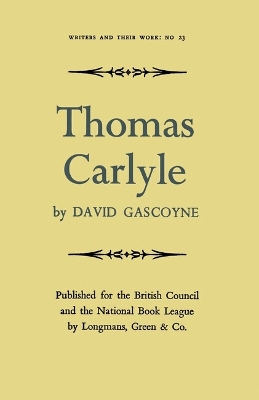Thomas Carlyle was indisputably one of the ‘Great Victorians’. As prophet and preacher concerning the most urgent public issues of his time, he wielded a commanding influence both upon his intellectual peers and his fellow-countrymen at large. He was a restless critic of society who, as The Times wrote of him, ‘denounced wealth without sympathy, equality without respect, mobs without leaders, and life without aim’.
When a general reaction against Victorian ideals set in, Carlyle's forthright and authoritarian exhortations and his impatience with democratic solutions became less acceptable to the spirit of the time, and his readership declined, at any rate during the first half of the present century; but in recent years there has been a significant revival in the study of his writings. Dr Campbell's essay discusses Carlyle's penetrating insight into the nature of his age, and especially into the domination of society by machinery. He analyses Carlyle's highly individual style, with its roots in Scottish speech patterns and Biblical and Shakespearean allusions, its repetitive structure, and its oratorical impetus. He assesses the significance today of Carlyle's The French Revolution and other historical writings, and sees him as a writer who, although not a conventional church-going Christian, upheld the virtues of a Christian society and proved a powerful force for good in shaping the thinking of his troubled century.
Ian Campbell, was Lecturer in English Literature at Edinburgh University,
was born in Lausanne and educated at Aberdeen and Edinburgh Universities. He taught Victorian, modern and Scottish literature, and co-edited the Duke-Edinburgh edition of the Carlyle Letters. His own biography of Thomas Carlyle was published in 1974.
- ISBN10 0582010233
- ISBN13 9780582010239
- Publish Date 1 May 1979
- Publish Status Out of Print
- Out of Print 28 November 2011
- Publish Country GB
- Imprint Liverpool University Press
- Format Paperback
- Pages 36
- Language English
